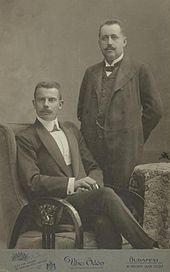Franjo Hanaman
Appearance

Franjo Hanaman (June 30, 1878 in Drenovci, Slavonia, Kingdom of Croatia-Slavonia, Austria-Hungary – January 23, 1941 in Zagreb, Kingdom of Yugoslavia - Croatia today) was a Croatian inventor, engineer, and chemist, who gained world recognition for inventing the world's first applied electric light-bulb with a metal filament (tungsten) with his assistant Alexander Just, independently of his contemporaries. They were granted the Hungarian Patent #34541 on December 13, 1904 in Budapest.[1] His invention of tungsten filament was also applied in improving early diodes and triodes.

Franjo Hanaman was born to a Croatian family as a second child of father Gjuro Hanaman and Emilija Mandušić.[2]
References
- ^ "Text of Patent" (PDF) (in Hungarian). December 13, 1904. Retrieved 2009-01-04.
- ^ Moser, Josip (January 2002). "Franjo Hanaman i njegovo djelo" (PDF). HEP vjesnik (in Croatian) (132). Hrvatska elektroprivreda: 11–13. Archived from the original (PDF) on 2014-07-14. Retrieved 2014-07-06.
